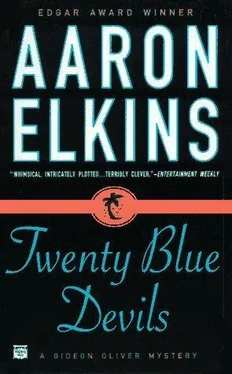Aaron Elkins - Twenty blue devils
Здесь есть возможность читать онлайн «Aaron Elkins - Twenty blue devils» весь текст электронной книги совершенно бесплатно (целиком полную версию без сокращений). В некоторых случаях можно слушать аудио, скачать через торрент в формате fb2 и присутствует краткое содержание. Жанр: Классический детектив, на английском языке. Описание произведения, (предисловие) а так же отзывы посетителей доступны на портале библиотеки ЛибКат.
- Название:Twenty blue devils
- Автор:
- Жанр:
- Год:неизвестен
- ISBN:нет данных
- Рейтинг книги:3 / 5. Голосов: 1
-
Избранное:Добавить в избранное
- Отзывы:
-
Ваша оценка:
- 60
- 1
- 2
- 3
- 4
- 5
Twenty blue devils: краткое содержание, описание и аннотация
Предлагаем к чтению аннотацию, описание, краткое содержание или предисловие (зависит от того, что написал сам автор книги «Twenty blue devils»). Если вы не нашли необходимую информацию о книге — напишите в комментариях, мы постараемся отыскать её.
Twenty blue devils — читать онлайн бесплатно полную книгу (весь текст) целиком
Ниже представлен текст книги, разбитый по страницам. Система сохранения места последней прочитанной страницы, позволяет с удобством читать онлайн бесплатно книгу «Twenty blue devils», без необходимости каждый раз заново искать на чём Вы остановились. Поставьте закладку, и сможете в любой момент перейти на страницу, на которой закончили чтение.
Интервал:
Закладка:
John looked at him, puzzled. “A…?"
"Hardware store,” Gideon said. “We can pick up a couple of shovels and whatever else we need."
John let loose a sigh of his own, then grinned and flopped back in his chair. “Whoo, I tell you, you had me worried there for a while."
"Sure, I'll just bet I did,” Gideon said with a faint smile. “Come on, let's go. We better get it over with before I return to my right mind."
Chapter 20
With Gideon at the wheel of the Renault and John navigating, they drove south on the coast road half a mile past the Centre Apatea mini-mall, then turned left onto a rutted, one-lane dirt road and began to climb the flanks of Mt. Iviroa, quickly leaving behind the coconut groves and rangeland of the coast and tunneling into the fragrant, gorgeous forest of the interior: frangipani, wild ginger, flame trees, gardenia trees, pandanus, wild orchid, everything prodigiously and brilliantly in bloom. A jungle of flowers. Overhead, the feathery leaves of acacias and eucalyptus filtered the sun; they seemed to be driving through a rolling net of shadows.
"Doc, we're doing the right thing,” John said, slouched in the passenger seat, one knee up against the dashboard. “In the great scheme of things."
"I know that, John. I'm not too worried about the great scheme of things."
"I know. You're worried about waking up tomorrow morning in the Papeete jail."
"Yes. Charged with grave-robbing.” Not, he admitted to himself, that such a prospect lacked a certain poetic aptness. John folded his arms and looked soberly out the window.
"Me too. You know, Doc, you really should have talked me out of this."
This afternoon mists that clung to the mountain suddenly enveloped them. One second they were in bright sunlight and sharp shadow, the next in a silvery fog that turned everything, even the air, a gauzy, spooky gray-green. The vegetation, profuse to begin with, became even more extravagant. Mosses hanging from the tree branches drooped like great, hairy swaths of drapery. Giant ferns ten feet tall pressed in on every side. And they began to catch glimpses of exotic birds-scarlet, blue, peacock-green-flitting through the foliage, and to hear strange calls.
"Welcome to Jurassic Park,” John said.. “Don't hit any pterodactyls."
They crested a ridge and swung downward into a broad valley after that, and, as suddenly as they had entered it they were out of the fog and back in the sun. A few minutes later the road, barely a road by this time, ended at an old, tin-roofed, falling-down greenhouse on a square plot of land that had long ago been hacked out of the jungle. Once upon a time it had been landscaped into a semiformal garden, but the plants hadn't been cared for in many years. In Tahiti that didn't mean they died, it meant they took over the place. Bougainvillea, poinsettia, and shrub acacia thrived, choking the yard and patio and clutching at windows, awnings, and porches.
"This is where the minister lived in the old days,” John said, then pointed directly across the road. “And that's the cemetery."
It was, as he'd said, tiny; a grassy plot perhaps a hundred feet square, with a slowly collapsing white picket fence around it. Unlike the lot across the road it wasn't totally abandoned, but it wasn't well cared for either. The grass had been mowed sometime in the last few weeks, the fence painted sometime in the last few years. The afternoon sunlight was harsh, the air still and hot-hotter by far than on the coast below-and the immediate scene stark and unwelcoming.
Gideon turned off the ignition and sat, squinting into the glare without moving, listening to the steady rasp of insects from the bush.
John, halfway out his door, glanced at him sharply. “You're not gonna get cold feet on me, are you?"
Gideon shook his head. “How can I? I already have cold feet.” But of course this was mostly to make John feel guilty, to let him know that if anything went wrong they both damn well knew whose fault it was.
They put on straw hats they'd gotten at the hardware store, took from the truck a plastic sack with digging equipment and a couple of liter bottles of Vittel mineral water, and stepped through the cemetery's open, leaning gate. There were about fifteen graves in all, scattered in no particular arrangement. A few were French burials with simple, straightforward headstones ("Ici repose Pierre Leblanc"). The rest were in the traditional Polynesian style; rectangular beds of white sand protected by low, lean-to roofs of corrugated metal and rimmed with a border of whitewashed stones. Some of the Tahitian graves had long-dead potted flowers on them, the pots overturned, the dry stems scattered. None had names or headstones.
John led Gideon to a grave along the far fence. “This is him."
"We think."
"Hey. Don't start that again."
Clearly, the grave was new. The lean-to roof had no stains of rust. The flowers were fresh; nine pots filled with gardenia and jasmine were set out in three equally spaced rows. A small, white wooden cross at what Gideon took to be the head distinguished it from the other Tahitian burials.
"Well, I guess we should start,” John said with noticeably less than his usual resoluteness.
So, Gideon thought, notwithstanding the oven-like heat it appeared they had four cold feet between them, not two. He finally took pity on his friend, knelt down decisively, and began to remove the potted plants and set them aside. “Come on, John, we'll see what we see.” He took two spade-shaped hand shovels from the sack. “We'll start at the center and work toward the ends. Just take it down about an inch at a time. Skimming motion. I don't think this is going to be very hard."
But it was. Although the sand was easy enough to get through, they had to dig on their knees because of the low roof. And while the layer of metal just above their heads shielded them from the direct rays of the sun, it focused the heat downward and kept it there. In less than five minutes they took off their shirts and then had to remove their sunglasses because the lenses were greasy with perspiration. Sweat ran down the hollows of their backs, gleamed on their forearms, dripped from the ends of their noses.
The sand turned out to be only a top-dressing. At about eighteen inches it gave way to a dark, moist, loamy soil.
"Bad sign,” said Gideon, breathing hard.
"No problem,” said John, also huffing. “It's easy to dig.” He tossed a shovelful onto the growing pile beside the plot.
Gideon sat back on his haunches to unkink his spine and to gulp from one of the blue plastic bottles. “That's not what worries me. When you put an unprotected corpse in ground like this it can bond with the soil as it decomposes. It can take days to get it free."
"That could be a problem,” John agreed. He took the bottle from Gideon, drank deeply, worked his shoulders, and picked up his shovel again. They returned to the first-Gideon-then-John-then-Gideon pattern they had fallen naturally into and dug, rhythmically and silently, for twenty minutes. They had gotten down to about two feet below the surface, kneeling face-to-face in a trench about three feet by five, when Gideon spoke abruptly.
"Stop."
John stopped instantly, looking at the lumpy, earth-colored protuberance that the last sweep of his spade had exposed.
"What is it?"
"The left knee, I think. Slightly flexed.” With his hands Gideon brushed the dirt away.
They were looking directly down into the open joint. Gideon could see the knucklelike distal end of the femur, the smooth concavities of the tibial condyles into which it fit, the small, pointed eminence of the fibula's styloid process. There were still some shreds of ligament and meniscus-the slippery, round pad of fibrocartilage that kept the bones from grinding on one another-but all in all a relatively clean joint. This was good news; it suggested that the defleshing process had advanced since the time the photos had been taken. The fibrous ligaments and capsular membranes of the knee were among the toughest tissues in the body. If they were gone, then maybe there wouldn't be much left on the bones anywhere else, and that would make his job easier and faster, not to mention a great deal less unpleasant.
Читать дальшеИнтервал:
Закладка:
Похожие книги на «Twenty blue devils»
Представляем Вашему вниманию похожие книги на «Twenty blue devils» списком для выбора. Мы отобрали схожую по названию и смыслу литературу в надежде предоставить читателям больше вариантов отыскать новые, интересные, ещё непрочитанные произведения.
Обсуждение, отзывы о книге «Twenty blue devils» и просто собственные мнения читателей. Оставьте ваши комментарии, напишите, что Вы думаете о произведении, его смысле или главных героях. Укажите что конкретно понравилось, а что нет, и почему Вы так считаете.












